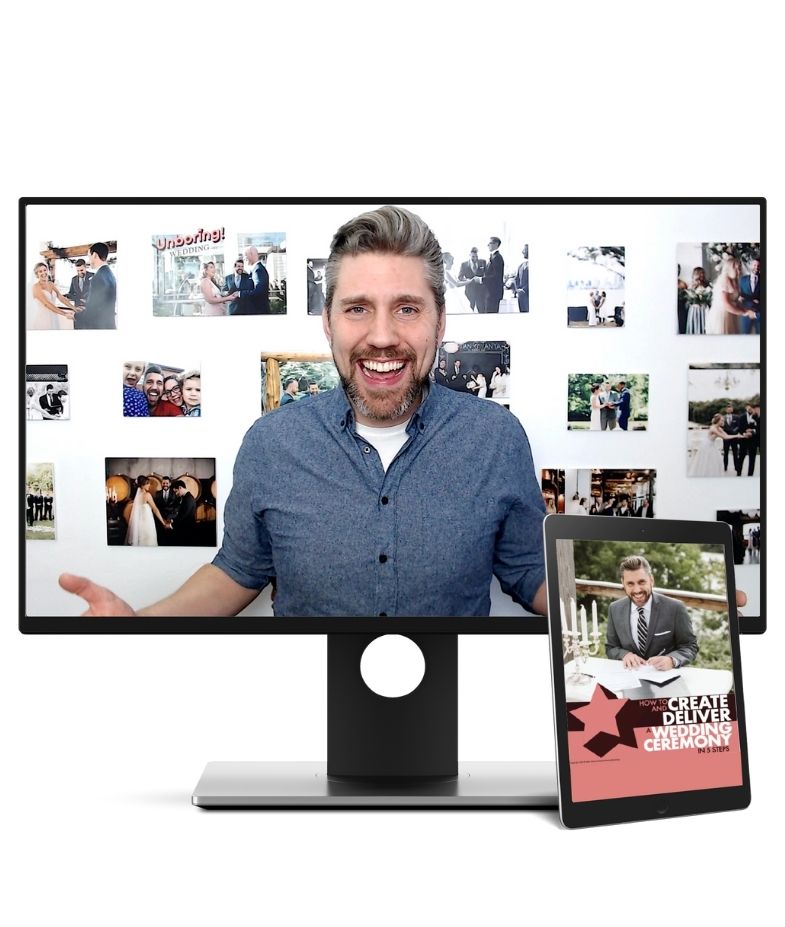As a wedding officiant, I consider it a godsend when my couple has hired a wedding planner as well.
Professional wedding planners are logistical ninjas and know how to run a tight ship. That’s good news for us officiants!
I’ve officiated many a wedding where there’s no planner. That means it falls to me to do everything from arranging chairs to corralling the wedding party at the back.
Simply, wedding planners are officiants’ best friends on the wedding day.
That said, I’ve had a few challenging moments when working with wedding planners as well. Starting out, I got blindsided a couple of times by very strong personalities. I stepped out of the way when I shouldn’t have, or got ruffled by planners when a couple of simple principles would have avoided conflict.
Thankfully, the days of trying to navigate wedding planners are behind me. I stick to these 4 tips when I go into a wedding working with a wedding planner.
1. Share the ceremony script
As I discuss in my post about writing the perfect 10-part wedding ceremony, a few weeks before the wedding you’re going to have a ceremony script. But to create that script, you’re ideally going to have a one-hour-or-so tete-a-tete with your couple. And in that tete-a-tete, you’re going to ask them who their planner is and maybe get the planner’s email address.
A great way to make first contact with the planner is not just say hello but also to include your script.
I use Google docs, so it’s very easy to loop in the planner by simply adding the planner to the list of shared members on the document.
We can then fire off an email letting the planner know that s/he is welcome to download away, and that we’re so excited to be working together on this wedding!
2. Split the rehearsal spotlight
I’ve had some tricky moments at rehearsals with wedding planners. When I was starting out as an officiant, I couldn’t figure out why. Then I realized it: wedding planners encounter a disproportionate number of non-directive, generally incompetent officiants. That’s why some of them just grab the reins at the start of the rehearsal and never let go, treating we officiants like one of the bridal party. But… shouldn’t we be somewhat in charge, here? After all, we’re presiding over the ceremony!
When I decided to intentionally split the spotlight with the wedding planner, things changed immediately.
Notice how I say split the spotlight. That means: it’s 50/50. We don’t steamroll the planner and pretend she doesn’t exist. But neither does she take centre-stage and start ordering you around.
The trick here is to arrive at the rehearsal and be clear about communicating your different roles and what is going to happen.
So when we arrive at the rehearsal, we of course say hello to the couple, and then introduce ourselves to the planner. Then, we give the planner an overview of how we’re planning to run the rehearsal and ask the planner how she’d like to partner in helping it run soothly.
For the most part, weddings planners are extremely aware that the rehearsal should be in the hands of the officiant! But I think their bad experiences sometimes cause them to take charge more than they even want to.
I recommend giving a clear signal in that introductory conversation with the planner: we’re a competent officiant, we know what we’re doing, and we would love to equally share the rehearsal with the planner. So we say something like, “Okay, I’ll kick things off, I’ll introduce you, you can make any comments, and then I’ll lead everyone through the rehearsal like this….”
As always, communication is key, and it’s best done ahead of time instead of playing out a weird power struggle in front of all the rehearsal guests.
(For more on how to run and successful and fun wedding rehearsal, read my full post on wedding rehearsals here.)
3. Make your non-negotiables clear
I only put my blind trust in a planner once. And I vowed never to do it again.
I know that sounds jaded – like I should talk to my therapist about it, but here’s what happened.
It was about 10 minutes past start time and we were ready to begin the ceremony. The groomsmen, the groom, and I were all lined up at the back and ready to go. All the guests were seated and eager for things to begin. I asked the planner where the bride was exactly. She told me the bride’s car had just pulled up and she was just coming into the (rather huge) building.
I said I’ll wait until I know she’s here before beginning.
But this planner – superb in what she does and quite famous in Toronto – assured me that wasn’t necessary. I could just go ahead and kick things off. Reluctantly, I relented, and filed in with the groom and his party.
I welcomed everyone, gave the opening announcements, warmed everyone up like I do, and said, “With that, let’s begin.”
The processional music started, that’s when the wait began.
We waited. And waited. It was probably only about 3-4 minutes before the first bridesmaid rounded the corner, but it felt like an hour. There were nervous giggles from the guests, some pained expressions from the groom, reassuring backslaps from the groomsmen. The DJ had to reboot the song in the middle of the processional.
And all the while I stood there, gritting my teeth, vowing never to let my instincts – and my non-negotiables – be overlooked again.
Now I always explain my non-negotiables to the wedding planner if something comes up that makes me feel less than comfortable. There are ways she does things, and ways I do things. We can have it both ways.
For example, I never take the front without going through my pre-ceremony routine and checking in on both members of the couple in person the minute we’re ready to start. I ask each of them, “Do you want to get married?” It’s one of my non-negotiables.
As officiants, we all have our non-negotiables – things we need to check off our list to feel confident and secure as we begin the ceremony.
In a nutshell:
- Don’t let the wedding planner talk you out of your non-negotiables.
- Explain to the wedding planner why your non-negotiables are so important to you. The great ones always understand!
4. Give ’em a lotta love
There are a few ways to thank your wedding planner colleague after the ceremony is done.
First of all, say thanks! I always try to find the planner after the wedding and let her know what a pleasure it was to be fellow vendor on this wedding.
The second thing you can do is follow the wedding planner on Instagram and tag her in any pictures you’ve taken. And make some comments about how great she and her company are. When you start building a community of vendors you know, like, trust, and work with repeatedly, that’s when the job starts getting really fun!
The last thing you can do is personally recommend some of the planners you’ve worked. Use your own website, social media, your WeddingWire profile, your blog, or do it in person when you meet your couple for the first time!
Wedding planners are some of the most talented people you’ll ever find in the event space. And personally, thanks to jaw-dropping pros like Michelle Cliffe at A Good Fork, Kari Lywood at Kari Lywood Events, Tanya from Rebecca Chan Weddings & Events, Jessica at JSP Industries, and Christina Clappison at Stealing Cinderella Events, I’ve been able to concentrate on the job I have to do up front. Meanwhile, amazing planners like them work their eagle-eye jiu-jitsu on the thousand moving parts that make a wedding fabulous!
(See what I did there? If you don’t, see the very last paragraph above.)
As wedding service providers, we all want to work well together.
As officiants, working well with our planner-colleagues means sharing, communicating, and showin’ ’em the love.
After all, who helps us do our jobs well better than a great wedding planner?

